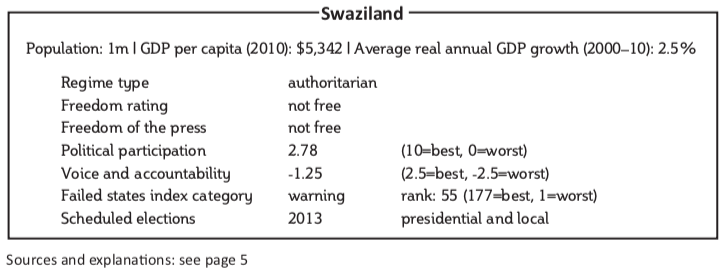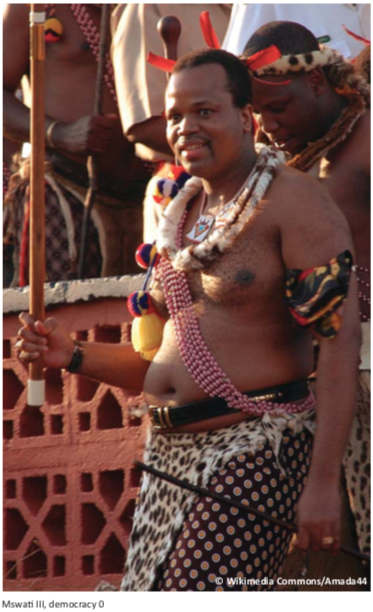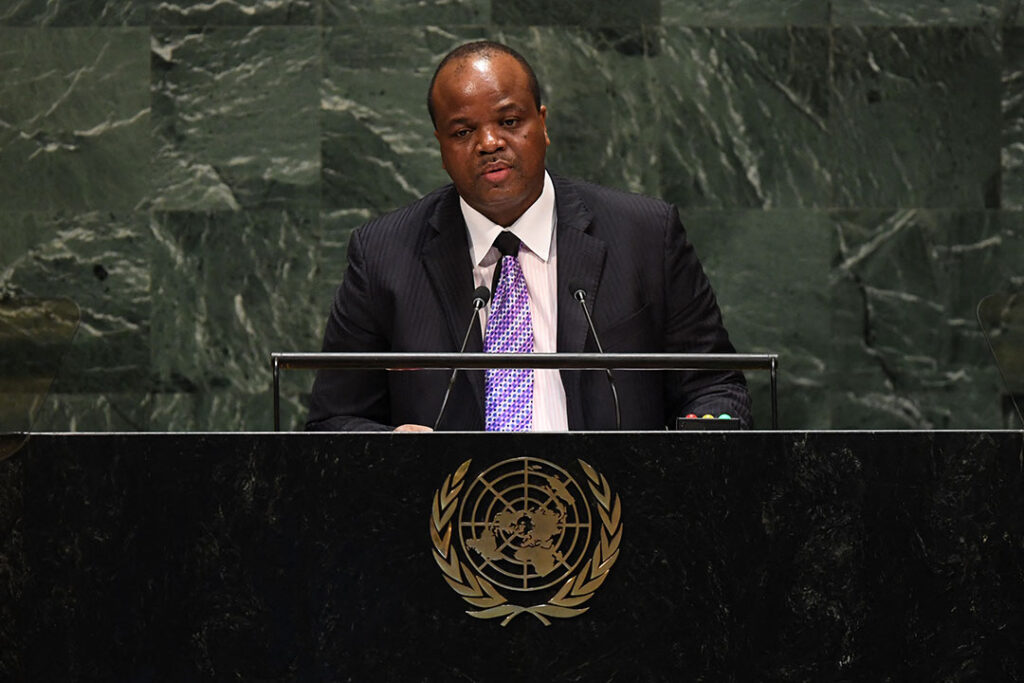Across Africa opposition parties fight governments for power. In Swaziland, they are fighting simply to exist.
by Louise Redvers
Next year Swaziland is due to hold its eleventh election—but don’t expect a colourful campaign period of posters and rallies, because in Swaziland, Africa’s last absolute monarchy, political parties are illegal.
King Sobhuza II outlawed political parties when he seized executive powers in 1973. He created the so-called Tinkhundla system of government, a decentralised structure comprising 55 districts. Members are elected to the National Assembly as individual representatives of these districts, instead of along party lines. This restricts organised challenges to the king, who personally appoints the prime minister, cabinet, senior judiciary and has the power of veto over parliament.
Although the 2005 constitution enshrines the right to freedom of association, there is no legal provision for the registration of a political party and Swaziland has developed a nasty reputation for the treatment of those who dare challenge King Mswati III’s authority.
In May 2010 an engineering student died in custody after being arrested at a Labour Day event. His crime was wearing a T-shirt bearing the logo of an opposition party, the People’s United Democratic Movement (PUDEMO).
Officially, Sipho Jele, 34, committed suicide—he was found hanged in a prison toilet—but many allege the police tortured him to death.
PUDEMO leader Mario Masuku has spent extended spells in custody and the party—despite not legally existing—has been banned under the country’s draconian Suppression of Terror Act.

Despite the government crackdown, the party maintains local branches and holds regular meetings with diplomatic and foreign entities, in many ways ridiculing the government’s refusal to acknowledge political parties. “The Swazi regime does not recognise us but this is like saying it is night when it is day,” Mr Masuku told Africa in Fact.
There are seven groups (including PUDEMO) calling themselves political parties in Swaziland. There are also a number of pro-democracy organisations and a noisy trade union movement that has been a de facto opposition, staging labour demonstrations that challenge government and its policy.
All these formations are united in their calls for multiparty democracy but they remain bitterly divided about what role the monarchy, which many Swazis hold in high regard, should play in a democracy.
According to Swazi culture, the king is umlomo longacali manga (the mouth that tells no lies) and traditional events such as the annual Reed Dance ceremonies are deeply respected.
Some parties, like the Swaziland Democratic Party (SWADEPA) and Sive Siyinqaba, believe that a constitutional monarchy, like in Lesotho, is the way forward for Swaziland.
PUDEMO, once seen to be strongly anti-monarchy, appears to be slowly embracing this position, although “the people will decide themselves when the time is right,” Mr Masuku said.
But smaller movements, such as the Communist Party of Swaziland (CPS), the African United Democratic Party (AUDP) and the National Congress for Democratic Change (NACODEC), are calling for an end to the royal family’s powers and privileges.
The South Africa-based Swaziland Solidarity Network (SSN) backs this position and regularly attacks King Mswati III, who is infamous for his 13 wives and profligate spending while two-thirds of his people languish in poverty and one in four have HIV.
The SSN, comprising mostly exiled Swazi students, is run out of the offices of the South African Communist Party (SACP) in Johannesburg and helps fund its neighbour’s union activities.
Sidumo Dlamini, president of the Congress of South African Trade Unions (COSATU), was born in Swaziland. COSATU’s pro-PUDEMO stance has raised the hackles of some Swaziland union members who support other parties.
Coupled with a very public falling out with PUDEMO, this indignation highlights the deep divisions among the pro-democracy movement that make it hard for international donors to navigate.
Moreover, despite the outspoken condemnation of King Mswati III by COSATU and its ruling-party alliance member, the African National Congress, there was talk last year of South Africa giving a $355m loan to Swaziland to help it through a liquidity crisis.
Conditions for the bailout included fiscal reform via an International Monetary Fund (IMF) programme and holding dialogue about regime change. Neither has been met and the money has stayed in Pretoria.
Swaziland’s upcoming election is another divisive issue. PUDEMO wants to repeat its 2008 position and boycott the poll, as does Ngwane National Liberatory Congress (NNLC), one of Swaziland’s oldest opposition parties, formed in 1963 as a pan-Africanist movement before independence from Britain.
PUDEMO’s Mr Masuku is resolute. “We do not wish to enter through the backdoor,” he said. “Political parties must be unbanned and allowed to register properly and our constitutional rights must be upheld. We want multiparty democracy.” However, SWADEPA and Sive Siyinqaba say they will take part. If elected, their members plan to stand as individuals in constituencies and act along party lines with a view to table motions and influence government policy.

SWADEPA’s president, Jan Sithole, is a respected former union leader who launched his party in September 2011.
“Boycotting is one strategy of putting pressure on the regime but we have decided to try a new approach and to try influence from within,” Mr Sithole said. “We have not changed our mind about this regime which we believe is cancerous and has utterly failed the people of Swaziland, but we want to test the ground and try something new, taking the agenda of the street into parliament.”
He rejected PUDEMO’s position that party members standing in the election would endorse theTinkhundla system, saying that earlier boycott tactics had left the government unchecked.
Despite this fighting talk most Swazis are less willing to speak openly about their political views, silently conditioned by a system that uses patronage to control its middle classes and fear to silence the impoverished majority, few of whom have basic land rights.
In an August 2012 situation report for the Institute of Security Studies in South Africa, Dimpho Matsamai noted that Swaziland’s government had been very effective in using culture and tradition to propagate the Tinkhundla system.
“The idea that Swaziland is a justified exception to the political plurality concept is premised on presumptions that its traditional and cultural structures are incompatible with or alien to modern practices of democracy,” he said.
In rural areas, where many still live off the land in traditional homesteads without water or electricity, Swazi citizens are dependent on traditional chiefs who hold control over land and local food aid programmes, making no secret of rewarding their most loyal subjects.
However, in the past 18 months the fear of challenging the status quo has begun to fade due to the country’s perilous economic situation.
In 2009-10 its income from the Southern African Customs Union, a region which accounts for over 90% of its export trade, fell by 60%, plunging it into a liquidity crisis that forced the government to mortgage off state assets to pay public salaries. Basic health and education services suffered terribly. The outlook for 2012 remains “challenging”, according to the latest IMF assessment.
Mr Sithole believes that the economic crisis has changed the game in Swaziland. People are now making the connection between poor governance due to lack of democracy and their own suffering, he says.
Citing an August Sibaya(people’s parliament), a traditional Swazi open-air forum for expression, Mr Sithole said that people at the gathering came forward to criticise the government and declared a need for change in the country.
“It has never happened before where people were so free to say what they said in such angry tones,” he said. “It’s no longer business as usual, this mood is unprecedented.”



